The Division of Urologic Surgery at Washington University School of Medicine in St. Louis has a long history as a pioneer in developing treatments for heart and lung conditions in adults and children. In 2022, Urologic Surgery faculty and trainees continued this legacy through excellence in clinical care, innovative research and rigorous training programs. The 2022 Urologic Surgery Annual Report highlights some of the many accomplishments in the division from the past year.
Faculty in this division are leaders and pioneers in their field. The long history of innovations and cutting-edge treatments within this division has contributed to its consistent ranking as one of the top urologic surgery centers in the country by U.S. News & World Report. Washington University urologists offer a range of treatment options, both surgical and nonsurgical, for conditions of the urogenital tract. The division is also nationally recognized for its research on detection and risk stratification of prostate cancer. The residency and fellowship programs train outstanding physicians through the expertise of faculty, high volume, diversity of cases and spirit of inquiry.
Highlights
Clinical
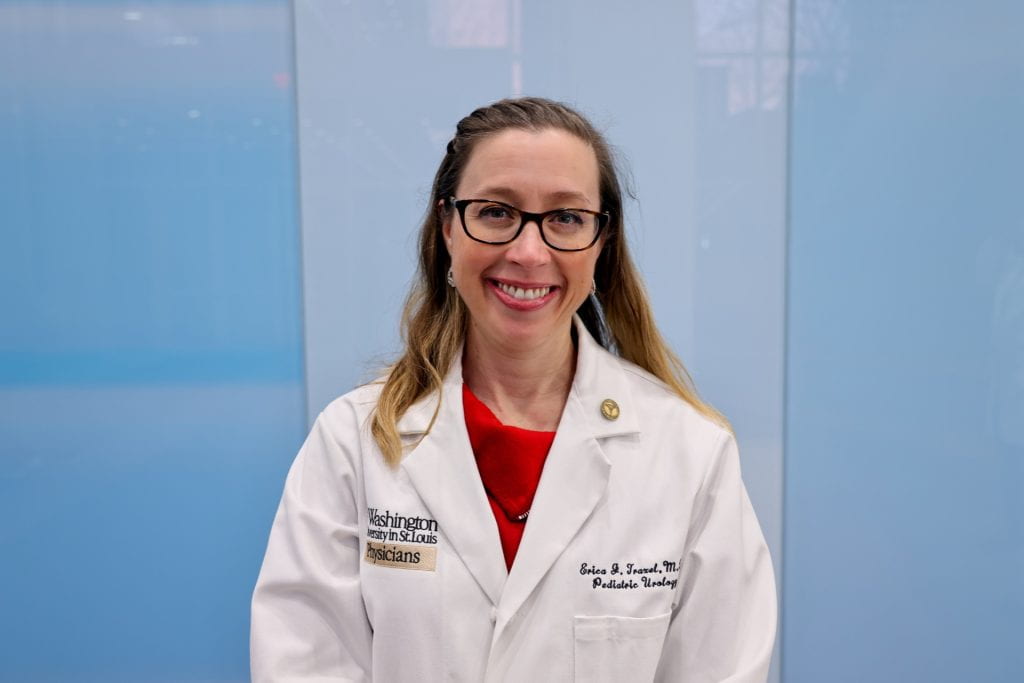
Urologic surgeon Erica Traxel, MD, and Vicky Peck, RN, Patient Safety and Quality Coordinator, were recognized as institutional leaders in the area of quality improvement and honored with the Barnes-Jewish Hospital Team Award for Quality Improvement at the 12th Annual BJC Patient Safety & Quality Symposium. In their project, “iTRUST: Identifying and Tracking Retained Ureteral Stents,” the duo worked to track every patient who had stents implanted by a urologist in an online system. Tracking stents enabled the team to determine whether patients returned to have their stents removed or changed, which reduced adverse patient safety events associated with retained ureteral stents.
Research
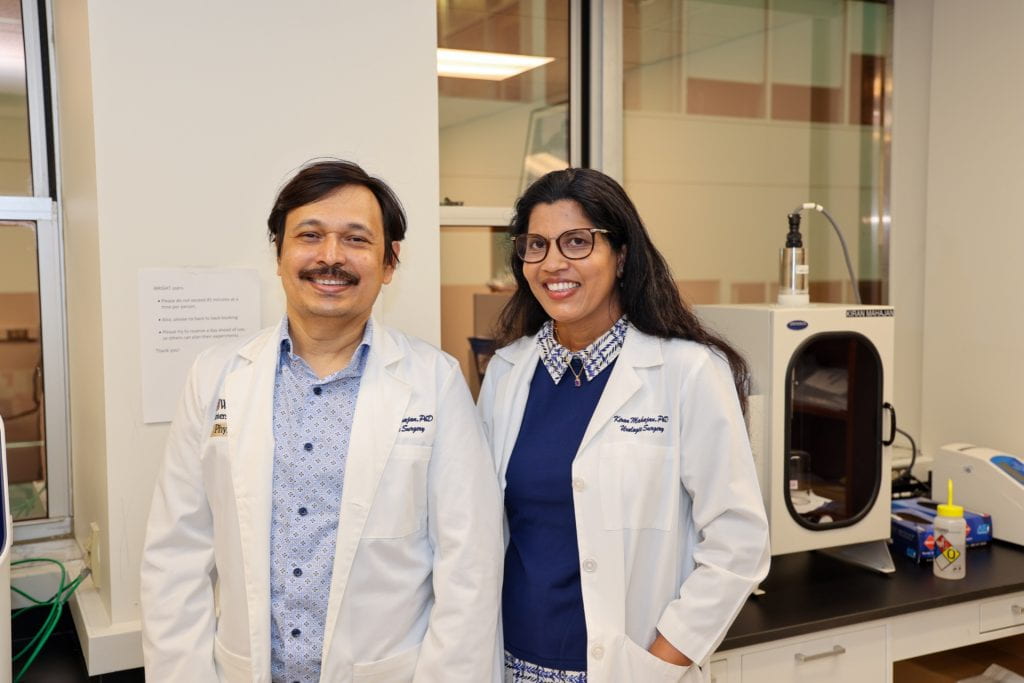
Nupam Mahajan, PhD, and Kiran Mahajan, PhD, are leading the fight against castration-resistant prostate cancer through translational research projects funded by the National Cancer Institutes, Prostate Cancer Foundation, and other sources. In one study, published this year in Science Translational Medicine, the team discovered a mechanism by which prostate cancer cells become resistant through molecular modification of the androgen receptor protein and identified a potential therapy that could overcome this resistance. In another project, published in Cancer Research, a journal of the American Association for Cancer Research, the investigators identified a tumor-suppressive RNA sequence that downregulates androgen receptors, making way for new therapeutic options.
Education
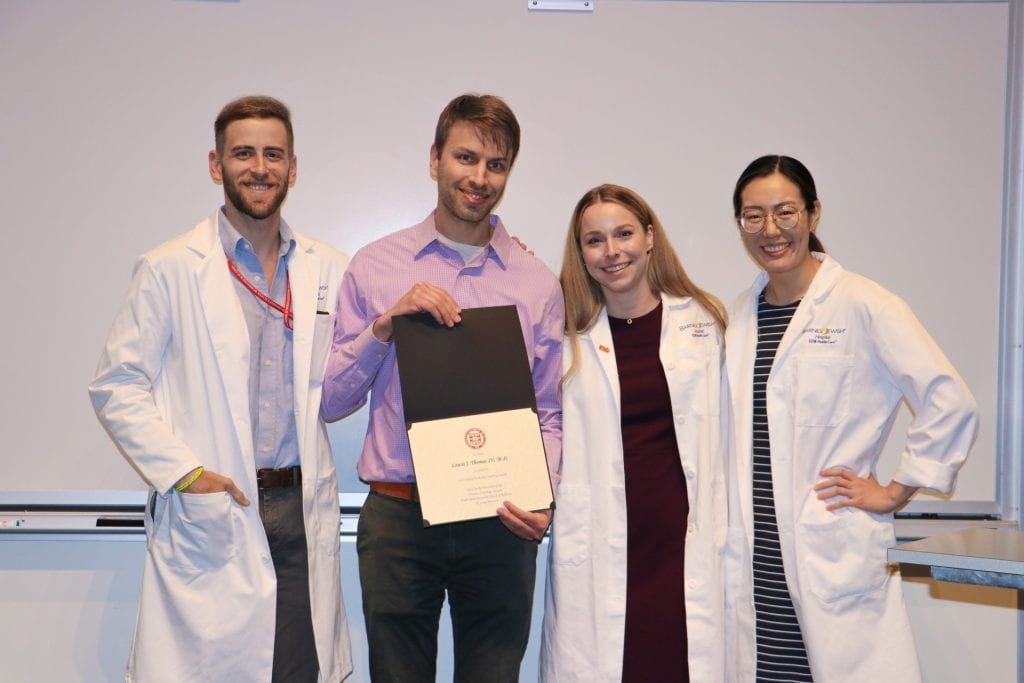
Washington University Urology faculty are consistently recognized for their excellence in surgical education. This year, urologic surgery residents honored Lewis Thomas IV, MD, with the 2022 Charles B. Manley Teaching Award. Jason Frankel, MD, associate director of the Urologic Surgery Residency program, participated in the Program Director Bootcamp Certificate Program, sponsored by the Academy of Educators at the School of Medicine. Frankel described the program as an opportunity to connect with others passionate about education as he continues to learn from program director, Erica Traxel, MD. Chief Resident Laura Lee, MD, is also involved in advancing medical education and serves as a representative of the Graduate Medical Education Committees on campus.
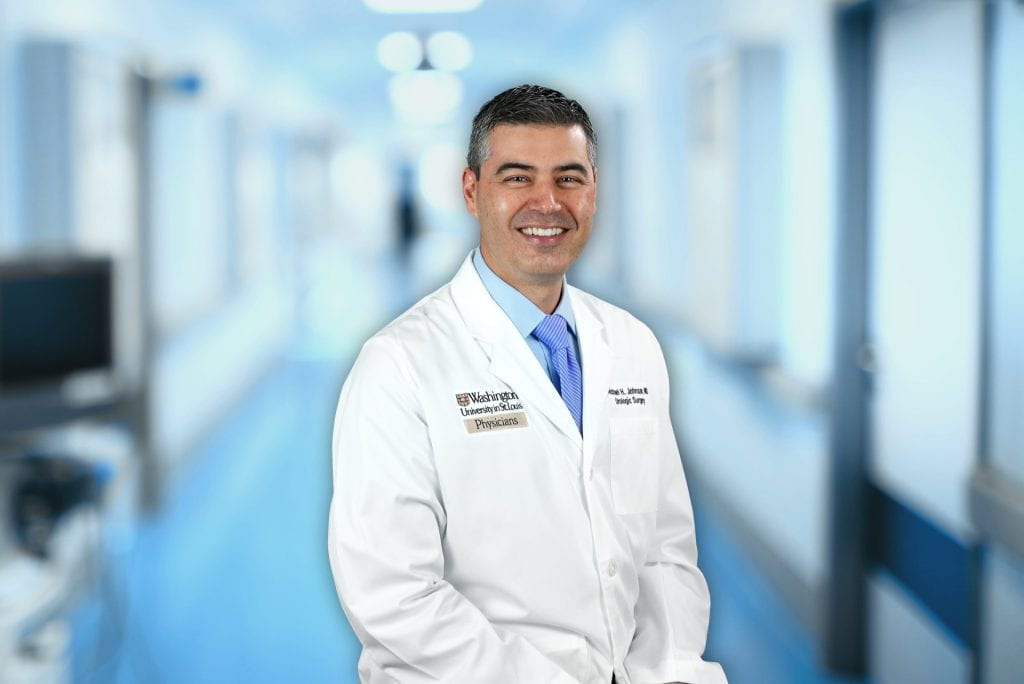
Expanding Access to Exceptional Urologic Care
As Washington University Urology continues to add several new surgeons to its faculty, patients throughout the St. Louis metropolitan area and beyond are now able to benefit from the expert care provided by the growing team of urologists closer to their own homes.
The expanding faculty list, combined with the wide list of facilities maintained by the BJC HealthCare organizations throughout the region, provides patients with the full spectrum of care they may have only been able to receive if they traveled broad distances to visit the division’s major clinical site on the medical campus.
Michael Johnson, MD, an alumnus of the division’s urologic surgery residency program, has returned to the institution to provide care for patients at both Missouri Baptist Medical Center and Progress West Hospital. Kimberly Berni, MD, and Jeffrey Glaser, MD, see patients at Progress West Hospital (O’Fallon, MO) and Barnes-Jewish St. Peters Hospital. Zeynep Gul, MD, joins urologists such as Arnold Bullock, MD, to provide care to patients at Christian Hospital in north St. Louis County. Michael Johnson, MD.
Across the river in Illinois, Paul Kogan, MD, sees patients for a variety of general urology services, including care for kidney stones, disorders of the bladder, male fertility and incontinence at Memorial Hospital Belleville*.
The Alvin J. Siteman Cancer Center has also expanded its presence throughout the region, giving patients who have been diagnosed with urologic cancers of the kidneys, prostate or bladder access to nationally recognized cancer treatments and clinical trials closer to home. Urologists see patients at six Siteman locations in the St. Louis area and Illinois, including the Washington University Medical Campus, Barnes-Jewish West County Hospital, Barnes-Jewish St. Peters Hospital, Siteman’s standalone facilities in North and South St. Louis Counties, and in Illinois at Memorial Hospital Shiloh.
*Clinical Services in Illinois provided by Washington University Physicians in Illinois Inc.
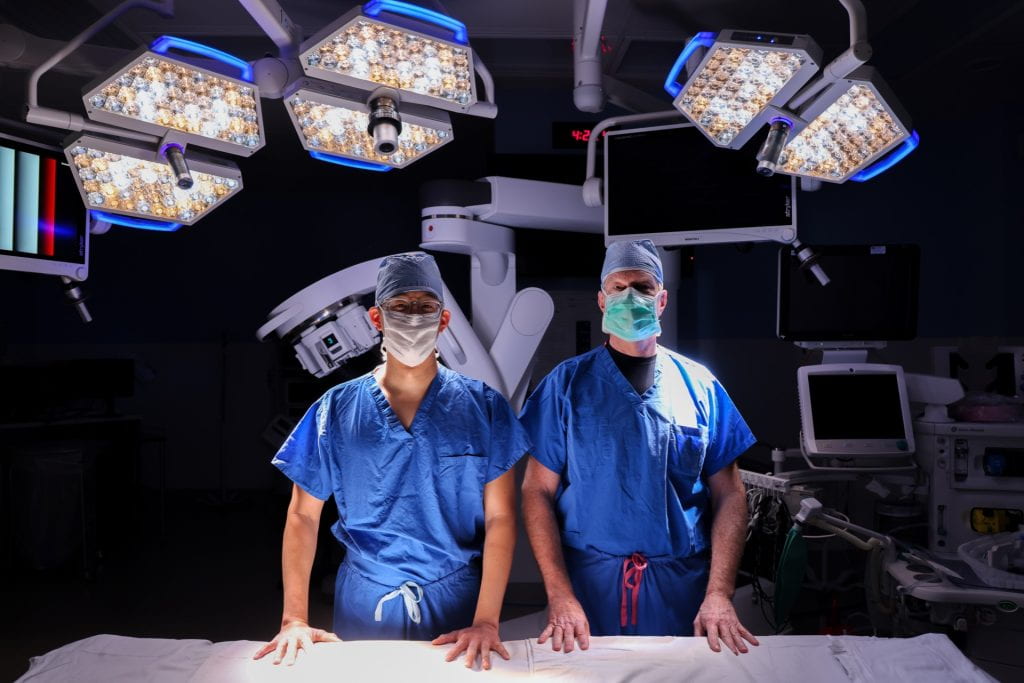
Fostering a Legacy of Excellence
Sam Bhayani, MD, MS, who has a long history of leadership at Washington University and BJC HealthCare, is now chief of the Division of Urologic Surgery. As Bhayani stepped into this role, he promised to continue to build on the division’s long tradition of excellence and innovation in urologic surgery, research and training.
Bhayani, the Holekamp Family Endowed Chair in Urology, also serves as Chief Medical Officer of the Faculty Practice Plan at Washington University School of Medicine. He maintains an active clinical practice focused on the treatment of kidney and prostate cancer with laparoscopic, percutaneous and robotic approaches. His research has focused on patient safety and quality improvement, screening and detection for urologic cancers, and developing new surgical techniques to treat kidney and prostate cancer. Bhayani and his colleagues within the Division established robotic partial nephrectomy as the standard of care for patients with renal cell carcinoma at the institution.
This legacy of excellence in the division is evident through numerous investigations into the use of prostate-specific antigen testing, laparoscopic nephrectomy procedures, urinary diversion via the ileal conduit, minimally-invasive urologic treatments and advancing care for kidney stones.
“Our team of urologists at Washington University has made a decades-long commitment to advancing care through minimally invasive strategies,” says Bhayani. “We want to perform surgery through smaller incisions or even noninvasively so patients are cured of their problem with minimum downtime.”
Much like Bhayani, R. Sherburne Figenshau, MD, and Eric Kim, MD, have become divisional leaders who perform minimally invasive procedures utilizing surgical robot systems to treat prostate and kidney cancers and research to support the efficacy and outcomes of these treatment methods. Zachary Smith, MD, has focused research and clinical practices on targeted prostate and kidney cancer care, which will allow surgeons and oncologists alike to further personalize a patient’s urologic cancer treatments exactly to their needs.
An outstanding surgeon-scientist who is at the forefront of research and management of benign lower urinary tract disorders, the division was honored to name H. Henry Lai, MD, as the Gerald L. Andriole Professor in Urologic Surgery.
“For over 15 years, Dr. Lai has been committed to advancing our understanding of benign urologic conditions and has garnered multiple grants that led to key research discoveries,” says Bhayani. “He has served as a mentor to countless urologists, many of whom are now national leaders in caring for people with these conditions. His impact in the field is felt far and wide beyond our institution, and this endowed professorship recognizes his essential contributions to urologic care.

Excelling in Education
The residency and fellowship programs offered by the Division of Urologic Surgery exemplify
Washington University’s proud legacy of world-class education. Trainees in these programs gain valuable experience alongside top-notch doctors as their mentors and instructors, exposure to a high volume of clinical cases and vast research opportunities.
The Washington University Urology Residency has a long and distinguished history in preparing graduates for successful careers in urologic surgery dating to 1910. Today, the residency places major emphasis on technical innovation and provides opportunities for residents to garner experience treating a volume and diversity of surgical cases among the highest in the nation for urologic residency programs. Led by Program Director Erica Traxel, MD, the urologic surgery residency offers a robust and well-rounded education to tomorrow’s innovators.
In 2022, the Division of Urologic Surgery celebrated the graduation of chief residents Yifan Meng, MD, Alex Parker, MD, and Carrie Ronstrom, MD; urologic trauma and reconstruction fellow Shellee Ogawa, MD; minimally invasive urology fellows Mark Biebel, MD, and Brijesh Patel, MD; and nurse practitioner fellow Mandi Tuhro, MSN, APN, FNP.
“The Division of Urologic Surgery is part of a small but elite group of academic urology programs that offers a nurse practitioner fellowship,” says Patient Safety and Quality Coordinator Vicky Peck, RN.
Urology fellows hold clinical and teaching responsibilities and are provided with extensive opportunities and resources for research. Operative care takes place at Barnes-Jewish Hospital, where fellows encounter and treat a wide array of conditions. Fellows gain graded clinical responsibilities throughout the course of their program and participate research program tailored to the individual fellow’s background, interests and goals.
“Our trainees graduate into truly remarkable, capable physicians with excellent reputations in urology,” says Division Chief Sam Bhayani, MD, MS, who is the Robert K Royce Distinguished Professor in Urologic Surgery. “Your reputation is made while the patient is looking at you for your leadership and your compassion.”
The education programs in the Division of Urologic Surgery prepare trainees for rewarding and successful careers as innovative academic surgeons. Each program encourages outside-of-the-box thinking to support trainees in advancing the field throughout their training, research and careers. With a history of graduating nationally recognized urologic surgeons, the division proudly upholds its legacy of fostering the growth of the next generation of groundbreaking physicians.
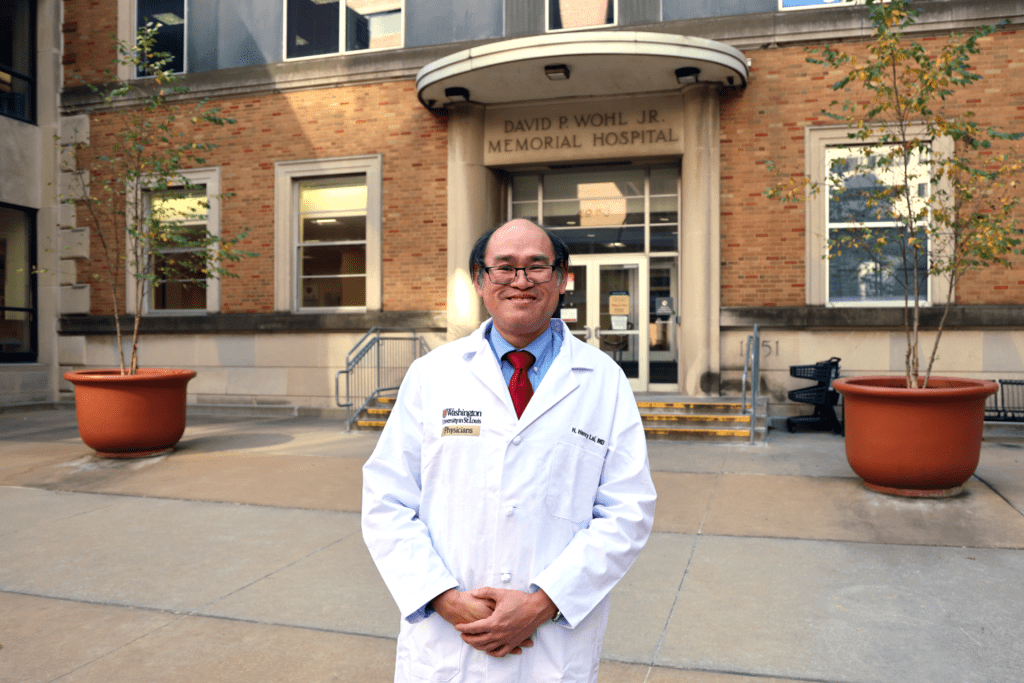
Pushing Onward
As the highest recruiting site for the Prevention of Urinary Stones with Hydration (PUSH) study, the Division of Urologic Surgery has received additional funding from the National Institutes of Health and National Institute of Diabetes and Digestive and Kidney Diseases to continue the research and development of the study.
PUSH is a study of the potential of increased fluid intake to reduce the risk of recurring kidney stones and methods to encourage patients to increase their daily hydration. The study reached its target sample size of 1642 patients in January of 2022, making it the largest randomized trial to prevent kidney stone recurrence.
Henry Lai, MD, who is the Gerald L. Andriole Professor in Urologic Surgery, and Associate Professor Alana Desai, MD, are principal investigators in the study. Lai serves as Director of Urologic Research at Washington University. His research has been consistently funded by the NIH and has made lasting contributions to the field of urologic research.
“I am so impressed by the amazing research program Dr. Lai has put together and his history of continuous funding by the NIH,” says Chief of Urologic Surgery and Robert K Royce Distinguished Professor in Urologic Surgery Sam Bhayani, MD, MS. “He is an inspiration and an asset to the division, the department and the school.”
The PUSH study utilizes smart water bottles and other incentive methods to allow participants to track their fluid intake and to encourage them to meet intake goals. Going beyond simply proving the benefits of hydration in preventing kidney stone recurrence, the study seeks to investigate methods of behavioral intervention to find the best ways to encourage patients to consistently meet fluid intake goals.
The most recent grant, totaling $630,000, will allow the study to continue and expand its efforts. High fluid intake has shown to be a particularly effective and low-risk intervention in preventing kidney stones in patients who have suffered from stones previously.
The PUSH study seeks to not only address the common health-care problem of lack of proper hydration, but to determine effective programs and incentives to keep patients on-track with their fluid intake goals and free from recurring kidney stones. Lai, Desai and their team have made great strides in this area of research over the course of the ongoing PUSH study and aim to continue pressing forward and determining the best methods of keeping their patients healthy and motivated to achieve their health goals.
Learn more about Washington University Surgery in this year’s Department of Surgery annual report.